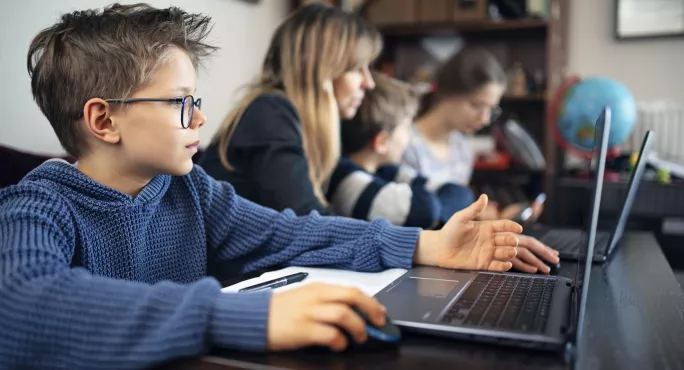Review of remote learning: What you need to know

Education Scotland has this afternoon published a report on how remote learning is working out in Scotland.
This report assesses remote learning from the standpoint of local authorities, with inspectors having started gathering evidence from councils just last week on Monday 11 January - the day on which the vast majority of pupils started learning away from school buildings once again.
Coronavirus: A review of online learning in Scotland
A second report, due to be published a week today, will be based largely on conversations of up to 45 minutes with a sample of school leaders, which started this week.
Background: What inspection of remote learning means for schools
Opinion: ‘The expectations of online learning are higher’
Coronavirus lockdown: Fears over ‘Big Brother’ remote-learning inspections
Also today: Teachers slam efforts to ‘replicate’ normal school year
Findings from the first report include:
- Overall, local authorities believe “there is more angst within the teaching profession and that teachers are more anxious than they were during the previous lockdown”.
- Local authorities have built on what they learned in the first lockdown, using the experience “to support professional learning and reflection, and consider new ways of working”.
- But “January 2021 continues to present challenges...as local authorities strive to ensure all children and young people get access and engage in high-quality remote learning”.
- Councils have “provided many learners with personal devices” - but all are “experiencing challenges” around “sufficiency and supply of information and computing technology resources”, including devices and wi-fi access.
- Many councils are having “difficulties in sourcing and purchasing IT devices, and are also experiencing delays within the supply chain”, with an impact on “the ability...to ensure equity of access to digital resources for all children and young people”.
- Poor online connections are “a challenge in a number of areas”, especially the most remote and rural parts of Scotland.
Our first report on the national overview of remote learning is now available. The report follows recent HM Inspector engagement with local authorities https://t.co/1Dg523pIF9 pic.twitter.com/VKPIESAfQc
- Education Scotland (@EducationScot) January 22, 2021
- Councils are “finding parental expectation regarding both remote learning and in-school attendance challenging” - they are contending with “unrealistic expectations of remote learning”.
- All councils have “offered ongoing professional learning” for staff - but some staff feel they “do not yet have the necessary skills and confidence to deliver remote learning effectively”.
- Councils have highlighted difficulties in “ensuring appropriate provision for pupils with additional support needs and for those in the early years”.
- Almost all local authorities are “concerned about the impact of school closures and remote learning” on the qualifications of senior secondary school students, and that “current arrangements are having a negative impact on the motivation of young people in the senior phase”.
- Live lessons are “not yet consistently available to all [pupils]”
- All councils have “developed clear, high-level plans and guidance for remote learning that reflect their individual context and take account of local circumstances in both urban and rural settings”.
- Councils have “set expectations that individual schools will design and deliver remote learning to reflect their own context and needs of learners”.
- “Almost all” councils use Glow, Scotland’s national digital learning platform; a few councils have “developed local digital platforms, including virtual learning environments and virtual schools or academies”.
- Local authorities feel better able to record and monitor online engagement by pupils than during the first lockdown.
The report’s recommendations
The report’s six recommendations - exactly as worded in the report - read:
- Ensure local authority planning, guidance and delivery for remote learning is updated to reflect the entitlements and expectations published on 8 January 2021
- Provide further professional learning for staff in local authorities and schools with a particular focus on the pedagogy of remote learning.
- Continue work to ensure equitable access to digital devices and online access for learners and staff.
- *Provide ongoing communication and engagement with parents about what remote learning is and the approach being taken by local authorities and schools to ensure a shared understanding.
- Continue to provide health and wellbeing support to learners, parents and staff.
- Develop and implement, at pace, approaches at local authority level to assure the provision of high-quality remote learning delivered by individual schools.
The full report, entitled National overview of remote learning 1: Local authorities, can be read here.
You need a Tes subscription to read this article
Subscribe now to read this article and get other subscriber-only content:
- Unlimited access to all Tes magazine content
- Exclusive subscriber-only stories
- Award-winning email newsletters
Already a subscriber? Log in
You need a subscription to read this article
Subscribe now to read this article and get other subscriber-only content, including:
- Unlimited access to all Tes magazine content
- Exclusive subscriber-only stories
- Award-winning email newsletters